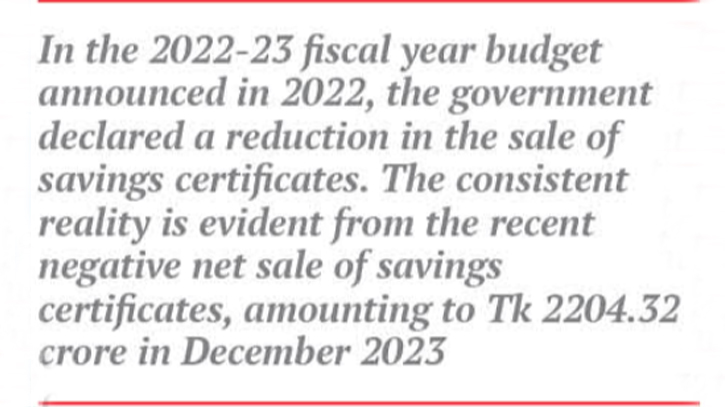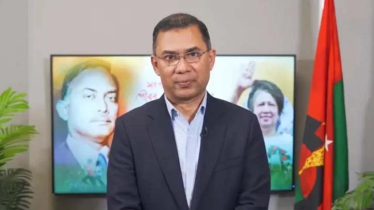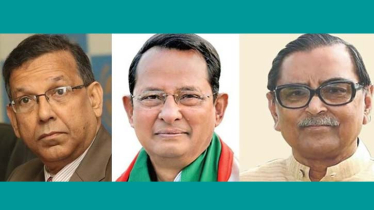
Photo: Messenger
Rezaul Karim, a retired government employee, concluded his service as a second-class government officer in 2019. He invested all the money he received after retirement in savings certificates. Until the onset of the pandemic, savings certificates yielded a good amount of interest, allowing him to contribute significantly to the expenses of his family of six members.
Even after the pandemic, Rezaul continued to receive fairly good interest. He used to earn Tk 15,000 in interest every three months for every lakh. However, for the past year, he has only received Tk 10,000 in interest for every 1 lakh taka. With this reduced amount, he couldn't maintain the same financial activities as before, prompting him to withdraw his savings. Now, he is uncertain about what to do with this money and where to keep it, given the low interest rate in the bank, concerns about the post office, and the risk of loss in the capital market.
Many others find themselves in a similar situation. In 2022, people would have invested in savings certificates if they had the means. However, in the 2022-23 fiscal year budget announced in 2022, the government declared a reduction in the sale of savings certificates. The consistent reality is evident from the recent negative net sale of savings certificates, amounting to Tk 2204.32 crore in December 2023.
Economists and stakeholders attribute the decline in sales to government decisions. The government appears more interested in paying interest than buying savings certificates, leading to various conditions imposed on their purchase.
For instance, a certificate of return has become mandatory for investments exceeding Tk 5 lakh. Moreover, from September 21 last year, the government reduced the interest rate of all types of savings certificates by 2 percent for investments exceeding Tk 15 lakh. In December 2020, the savings bank investment limit was reduced, and the withholding tax rate on profits increased from 5 percent to 10 percent, effective from July 1, 2019. A customer information database has been created to prevent corruption or the purchase of savings certificates with black money.
Due to these reasons, the common people have reduced the purchase of savings certificates. Customers are avoiding savings certificates, especially due to the decrease in interest rates. Rezaul Karim expressed his frustration, saying, “Earlier, I used to make a good profit for three consecutive months, allowing me to contribute to household expenses. We used to buy medicine, visit someone's house, and give gifts. However, the subsequent fall in interest rates, coupled with the increase in inflation, did not offset our costs. So, I withdrew my savings.”
Ahsan H Mansoor, executive director of the private research organization Policy Research Institute (PRI), told The Daily Messenger, “Savings were once the safest and most attractive investment sector for the common man. Consequently, the government's interest payments increased, leading to a reduction in borrowing from savings certificates and a decrease in their sale. The negative net sales in recent months are a result of reduced interest rates and various austerity measures. Therefore, the government has to pay the interest-principal from the treasury.”
He further added, "The prices of everything in the market are high, with inflation exceeding 9 percent. Costs have increased in all sectors, including transport, education, and medical, reducing people's ability to save. This is affecting the sale of savings certificates."
However, a top official of the Bangladesh Bank said that the International Monetary Fund (IMF) has suggested reducing borrowing from savings certificates. He told The Daily Messenger on the condition of anonymity, “The IMF has stipulated that the government's current debt from savings certificates should be reduced by one-fourth by 2026.” The IMF has given this condition to decrease the amount of expenses paid on account of profit in savings certificates. Besides, the government also does not want to take any loans at high-interest rates. Therefore, instead of acquiring new loans, the government has focused on repaying previous loans.
Where are common people keeping their money?
As the interest rate on savings certificates has fallen, many are cashing them before maturity. Those who have completed their term are not making new investments. So, where are the customers keeping this money?
According to the report of the Bangladesh Bank, 2 lakh 55 thousand 829 crore in cash was outside the bank in May this year. Suddenly, 36 thousand 48 crore taka increased in one month to 2 lakh 91 thousand 913 crore taka at the end of June. However, it started to decline again from June onwards.
It decreased to 2 lakh 66 thousand 354 crores in July, further decreasing to 2 lakh 58 thousand 356 crores in August, and stood at 2 lakh 53 thousand 505 crores in September. In three months, the cash held by people outside the banks decreased by 38 thousand 408 crores.
That is, common people have now started keeping their money in the bank again. However, there is still 2.50 lakh crore takas outside the bank. Regarding what the common people are doing with this money, a top official of the Bangladesh Bank told Messenger, “If people have money, it is usually invested in unproductive sectors—buying land or a flat, spending money on furniture and other things. But from the information we have, it can be seen that several customers have invested money in companies only on paper.
He also said, “Many have been cheated by investing in companies like MTFE, Onpassive. By investing in these companies without keeping their money in the bank, many clients have become bankrupt.”
Messenger/Disha








